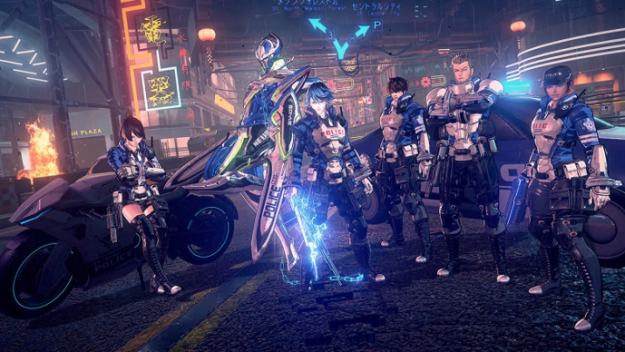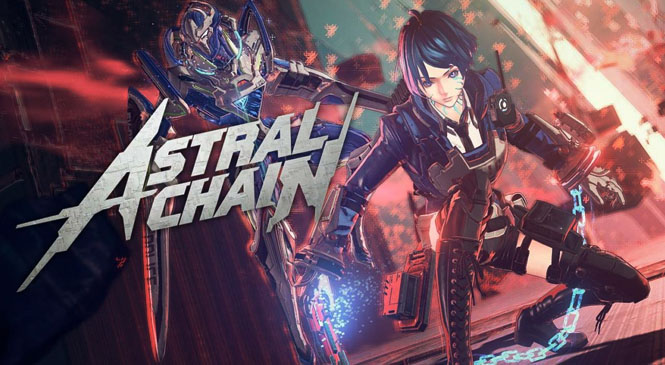Review: ASTRAL CHAIN delivers a Platinum Experience

Unsurprisingly, Platinum Games has crafted another tight gaming experience with excellent gameplay and an average story. Following their recent success, Nier: Automata, Platinum decided to make a cyberpunk game that has surprisingly few teeth.
The gameplay of Astral Chain is what one would expect from a Platinum title. It’s a fast-paced action game, similar to Devil May Cry or Bayonetta. The gameplay starts pretty simple, giving you a police baton and a gun, as well as a Legion, but as the game progresses, you start to get more options, like a sword, new moves, special skills, and new Legions, all of which are useful, but only in certain situations. The game demands that you experiment with different attack strings and Legion skills, as no layout works for every situation you’ll find yourself in. Sometimes, you might need to use a gun and the Arrow Legion to snipe flying enemies, or you might need to use the Axe Legion to defend yourself from strong ranged attacks.
As with most Platinum titles, dodging enemy attacks is key to survival, and the game always makes it clear when an attack is going to happen. Enemies very clearly choreograph their moves, but it’s never too easy to get out of the way, due to how strict the timing of your dodges has to be to get out of the way. It always feels like it’s your fault, and not the game’s, when you take damage, which is a good thing, because it encourages the player to get better at the combat system. The player always feels like they’re in complete control of the combat, and it’s very satisfying whenever you kill an enemy or dodge a strong attack. The rock/techno soundtrack helps make every fight feel important, and you almost never feel like you’re just wading through a generic mob of enemies.
The Legion system is what makes this different from other titles in the character action game genre. Legions are, without giving the plot of the story away, basically a second, robotic body that you can move around in tandem with your player character. You can also let the Legions fight on their own, if you want to focus on a cool combo without using your robotic friend. The gameplay is built around the Legions. You’ll constantly be summoning, them, sending them away to recharge their batteries, using their skills to get an edge in battle, or even use their chains to trap enemies in place.
You even get skill trees unique for each Legion that you get, which you can use to purchase new moves, new skills, or boost stats. Somehow, controlling two characters never feels difficult or clunky. Controlling both characters is easy, even if the game itself can be difficult in some sections. The Legions are also how you platform in this game, so the fact that controlling Legions never feels tough makes the platforming sections feel snappy. Even the vehicle sections, which are usually the weakest part of any Platinum Game, now feel fun to play, because you can summon a Legion to fight incoming enemies as you drive and shoot.

Graphically, the game is stunning. The cell shading really makes the game feel like you’re walking around in the world of an anime, rather than just playing another video game. The color palette is generally very diverse, even if there is a lot of blue and red at times. The places you are sent to explore are all dirty, high tech, densely populated areas, with plenty of sick and homeless people around every corner. These factors all make you feel like you’re living in a dystopian, cyberpunk society that’s on the brink of destruction.
The game only really falls apart in the story department. In spite of how good the story of Nier: Automata is, this game falls short in many different ways. First of all, the characters are either one note, like your fellow coworkers, or they’re never on screen long enough to get you to care about them, like your sibling. The only character that is entertaining in any sense is your father, and he doesn’t have much screen time, either. It doesn’t help that the character that you play is completely silent, making any dynamics that you have with your twin sister feel completely one sided and unconvincing.
Secondly, the game has no teeth to it. Not only did Nier: Automata have a lot to say about human nature and religion, but the cyberpunk genre as a whole has always had some sort of commentary on the world around it. You would think that a game with a questionable corporation that runs the entire planet has something to say, but it doesn’t. What you see is what you get. And the game ends with several questions that go unanswered. There are a lot of plot threads that go unresolved, and the ending of the game seems to promise that some of these things are going to be answered in a sequel game.
Overall, Astral Chain is a fun, high octane experience that does come up a little short in some areas. The game is a worthy addition to both the Nintendo Switch’s library, and to Nintendo’s long list of franchises. If Nier: Automata was a 10/10, then Astral Chain is an 8/10.
![]()




